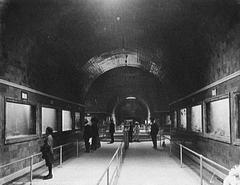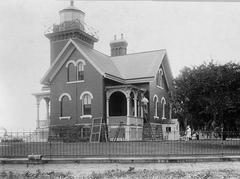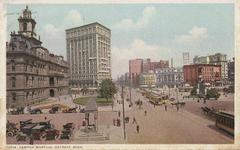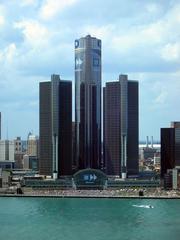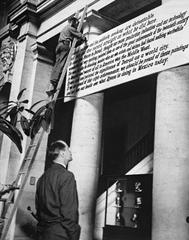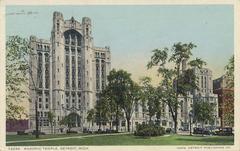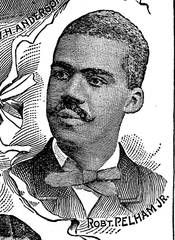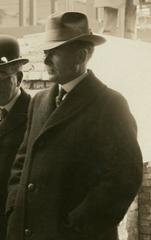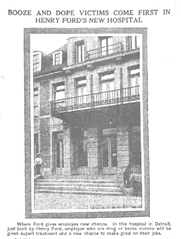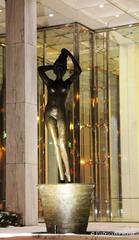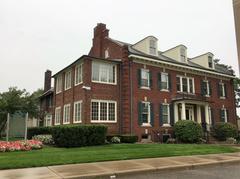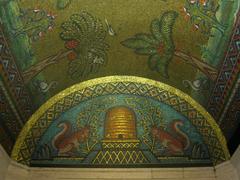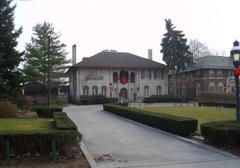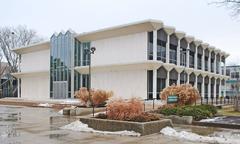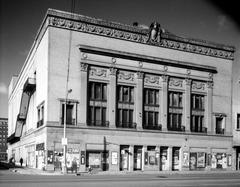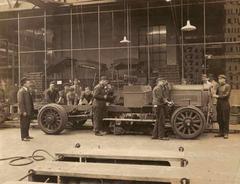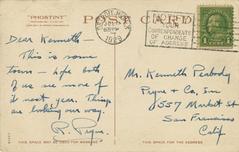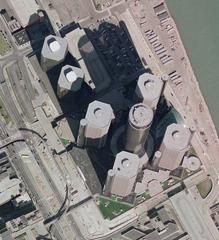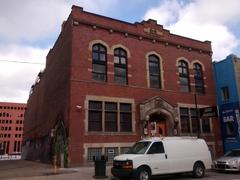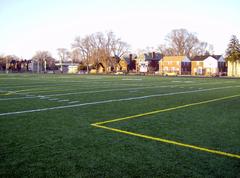
Pewabic Pottery Detroit: Visiting Hours, Tickets, and Complete Visitor Guide
Date: 03/07/2025
Introduction
Pewabic Pottery, founded in 1903 in Detroit, Michigan, is a living symbol of the city’s rich artistic legacy and a cornerstone of the American Arts and Crafts movement. Established by Mary Chase Perry (later Stratton) and Horace James Caulkins, this iconic ceramic studio began in a humble carriage house and blossomed into a nationally significant institution, now housed in a distinctive Tudor Revival structure designed by architect William Buck Stratton. Pewabic’s signature iridescent glazes and handcrafted tiles grace landmarks such as Detroit’s Guardian Building and Washington, D.C.’s Basilica of the National Shrine of the Immaculate Conception, embodying the spirit of artisanal creativity in an era of industrialization (Historic Detroit; Pewabic Pottery History; PBS).
More than a historical site, Pewabic Pottery thrives as a dynamic center for education, community engagement, and innovative artistry. Visitors can explore its galleries, participate in hands-on workshops, and enjoy guided tours that reveal the enduring significance of Pewabic in Detroit’s cultural landscape (Pewabic Pottery Plan Your Visit; Midstory).
Table of Contents
- History and Founding
- Artistic Innovation and the Arts & Crafts Movement
- Growth, Legacy, and Cultural Impact
- Transition and Preservation
- Pewabic Pottery Today: Visiting Hours, Tickets, and Visitor Information
- Tours, Workshops, and Special Events
- Educational Programs and Community Engagement
- Accessibility, Directions, and Amenities
- Shopping and Collecting Pewabic Pottery
- Nearby Detroit Attractions
- Frequently Asked Questions (FAQs)
- Plan Your Visit and Stay Updated
History and Founding
Pewabic Pottery was established in 1903 by artist Mary Chase Perry (later Stratton) and kiln innovator Horace James Caulkins. Inspired by the Pewabic copper mine in Michigan’s Upper Peninsula, the studio’s name reflects a deep appreciation for regional materials (Pewabic Pottery History). Initially operating from a “Stable Studio” in Brush Park, the pottery soon moved to a purpose-built Tudor Revival studio on East Jefferson Avenue in 1907—its current home.
The partnership of Perry Stratton’s artistic vision and Caulkins’ technical expertise, including the creation of the “Revelation kiln,” epitomized the Arts and Crafts movement’s reverence for handcraftsmanship (Wikipedia).
Artistic Innovation and the Arts & Crafts Movement
Pewabic Pottery was instrumental in Detroit’s Arts and Crafts movement, countering mass production with exquisite, handmade ceramics. Early works featured distinctive matte glazes and hand-tooled vases, while later innovations included the studio’s famous iridescent glazes, inspired by global ceramic traditions and achieved through relentless experimentation (Beat Insights; Arts & Crafts Collector). Pewabic tiles and pottery, often characterized by organic forms and geometric patterns, became highly sought after for both private and public spaces, from the Shedd Aquarium to Detroit’s churches and schools (Wikipedia).
Growth, Legacy, and Cultural Impact
By the 1920s, Pewabic had established itself as a Detroit institution. Under Perry Stratton’s leadership, the studio expanded its output and contributed to Detroit’s cultural identity, even collaborating with the city’s booming automotive industry to incorporate handmade art into industrial spaces (Midstory). Perry Stratton also advanced arts education, founding the University of Michigan’s ceramics department and teaching at Wayne State University (Historic Detroit).
Transition and Preservation
After Perry Stratton’s death in 1961, Pewabic Pottery was gifted to Michigan State University and later, in 1981, to the nonprofit Pewabic Society, which continues to steward its mission (Pewabic Pottery History; Arts & Crafts Collector). In 1991, the studio was designated a National Historic Landmark, cementing its place as one of America’s oldest operating ceramics studios (Wikipedia; Historic Detroit).
Pewabic Pottery Today: Visiting Hours, Tickets, and Visitor Information
Location: 10125 E Jefferson Ave, Detroit, MI 48214
Visiting Hours:
- Tuesday – Saturday: 10:00 AM – 5:00 PM
- Sunday: 11:00 AM – 4:00 PM
- Monday: Closed
- Closed on major holidays (Pewabic Pottery Plan Your Visit)
Admission:
General admission is free. Workshops, classes, and special tours require advance registration and fees. Check the official website for updates.
Tours, Workshops, and Special Events
Self-Guided Visits:
Browse the galleries, museum, and retail spaces at your own pace. The main floor features Pewabic ceramics and works from Michigan artists; the upstairs gallery offers rotating exhibitions on Pewabic’s legacy (Pewabic Plan Your Visit).
Docent-Led Tours:
Get behind-the-scenes access with guided tours, which require advance ticket purchase. Tours cover Pewabic’s history, working studios, and the process of ceramic creation (Lorenzo Cultural Center).
Workshops:
Hands-on tile glazing, wheel-throwing, and family workshops are available. Advance registration and fees are required (Pewabic Pottery Workshops; Pewabic Experiences).
Special Events:
The annual House & Garden Show in June features tours, demonstrations, auctions, and live entertainment. Other highlights include artist talks, seasonal workshops, and exhibition openings (Pewabic Garden Party).
Educational Programs and Community Engagement
Pewabic offers multi-week ceramics classes for adults and youth, mindfulness-based art therapy, and outreach programming for schools and community groups (Visit Detroit). These initiatives keep the studio’s legacy alive and accessible to all.
Accessibility, Directions, and Amenities
Parking:
Complimentary on-site parking is available in front of the building, with additional street parking nearby (Pewabic FAQs).
Public Transit:
Served by DDOT bus routes and accessible via rideshare.
Accessibility:
- Handicap-accessible parking and entrance ramp
- Accessible restrooms available upon request
- Some historic areas may have limitations; call ahead for specific needs (Lorenzo Cultural Center)
Amenities:
Restrooms, garden courtyard for picnics, and staff available for assistance. Photography is permitted in most areas for personal use.
Shopping and Collecting Pewabic Pottery
The Pewabic store offers a broad selection of handcrafted tiles, vases, home goods, and art pieces, including exclusive and limited-edition items. Proceeds support Pewabic’s nonprofit mission. Online shopping is available for most items (Pewabic.org).
For collectors, vintage and contemporary Pewabic ceramics are valued for their artistry and provenance (UP Antique).
Nearby Detroit Attractions
Pair your visit with other Detroit cultural sites:
- Detroit Riverwalk
- Belle Isle Park
- Detroit Institute of Arts
- Guardian Building
- William G. Milliken State Park
These attractions offer a complete Detroit experience and showcase Pewabic tiles in architectural contexts (Visit Detroit).
Frequently Asked Questions (FAQs)
Q: What are Pewabic Pottery’s visiting hours?
A: Tuesday–Saturday, 10 AM–5 PM; Sunday, 11 AM–4 PM; closed Mondays and major holidays.
Q: Is there an admission fee?
A: General admission is free. Workshops and special tours require tickets.
Q: Is Pewabic Pottery wheelchair accessible?
A: Yes, most main areas are accessible. Some historic sections have limitations; call ahead for assistance.
Q: Are guided tours available?
A: Yes, by advance reservation and ticket purchase.
Q: Can I participate in workshops?
A: Yes, workshops are offered for all ages and skill levels; advance registration required.
Q: Where can I park?
A: Free parking is available on-site and along nearby streets.
Q: May I take photos?
A: Personal photography is allowed in most areas; check for restrictions during special exhibits.
Plan Your Visit and Stay Updated
To ensure the best experience:
- Check the official website for current hours, events, and registration.
- Book tours and workshops in advance.
- Sign up for Pewabic’s newsletter and follow on social media for updates.
- Download the Audiala app for guided tours, event reminders, and exclusive content.
Conclusion
Pewabic Pottery stands as a beacon of Detroit’s creative spirit, offering a vibrant blend of history, artistry, and community. With free admission, engaging programs, and a convenient location near other major Detroit attractions, it’s a must-visit for anyone interested in art, architecture, or heritage. Plan your visit today and connect with Detroit’s enduring legacy of handcrafted excellence.
References
- Historic Detroit
- Pewabic Pottery History
- Wikipedia
- Midstory
- Beat Insights
- Arts & Crafts Collector
- PBS
- Pewabic Pottery Workshops and Visitor Information
- Pewabic Pottery Plan Your Visit
- Tourist Secrets
- Visit Detroit
- Pewabic Pottery FAQs
- Lorenzo Cultural Center
- Pewabic Garden Party
- UP Antique
- Chamber of Commerce


